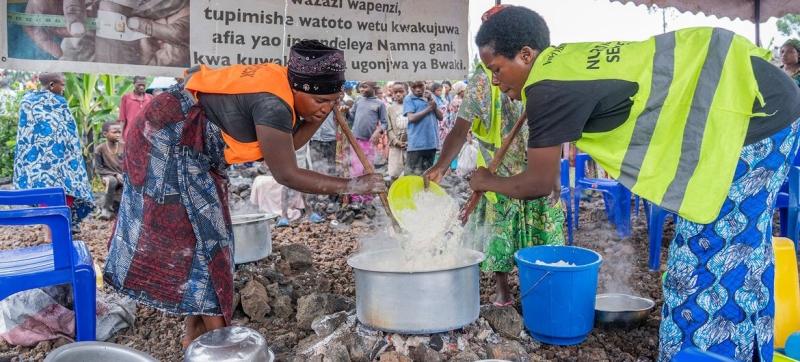
Emergency food assistance in Goma in eastern DR Congo. Crisis in DR Congo: famine worsens amid fighting and lack of funds Humanitarian Assistance
The humanitarian crisis in the eastern Democratic Republic of Congo (DRC) continues to rapidly deteriorate due to ongoing fighting that has forced tens of thousands of people to flee their homes. The UN World Food Program (WFP) warns about this.
Access for humanitarian organizations to areas captured by the M23 armed group at the beginning of the year remains extremely difficult. However, a serious shortfall in aid funding is exacerbating the situation.
WFP DRC Director Cynthia Jones said aid could be delivered more effectively if air access was restored.
“Two airports in areas controlled by the M23 have been effectively closed since the end of January… We are urgently calling for the creation of a humanitarian air corridor,” she said on Friday. video link from Kinshasa at a briefing in Geneva.
Emergency
Nearly 25 million people in DR Congo are facing a nutrition crisis (level three on the five-point ICF scale), according to new analysis from the Integrated Food Security Phase Classification (IFCI). Of particular concern is that about three million people are in a state of emergency (phase four) – almost double the number from last year.
“This means families are skipping meals, losing their livelihoods, selling their animals,” Jones explained.
According to the WFP, in some areas of eastern DR Congo people are already dying of hunger.
Meanwhile, as a UN agency spokeswoman noted, fighting between M23 and government forces continues, causing new waves of displacement. There are now some 5.2 million internally displaced people in the eastern part of the country, of whom 1.6 million have fled their homes this year. This is one of the largest crises of its kind in the world.
Financial crisis
At the same time, WFP is experiencing an acute shortage of funds. The agency has been forced to reduce the amount of assistance it provides, from 1 million people receiving it at the beginning of the year to 600,000 now. Without additional funding, only a fraction of those in need will receive the support they need, Jones said, calling for $350 million over the next six months. Otherwise, she said, WFP will be forced to reduce the amount of assistance twice. 300 thousand people will receive it – this is only 10 percent of those who need it.
Without an urgent influx of funds, all emergency food assistance programs in the east of the DRC may collapse by March 2026.
The financial crisis is also reflected in organization.
“We are closing offices, cutting costs, reducing staff and trying to maintain a minimum operational capacity in extremely difficult conditions,” Jones said.
Meanwhile, humanitarian assistance is vital for displaced people in the provinces of North and South Kivu, Ituri and Tanganyika. People lack access to money and other means of livelihood.
“Women, children, men – they all suffer endless violence from non-state armed groups. People are fleeing conflicts, they are exhausted and desperately need peace,” the WFP representative emphasized.
